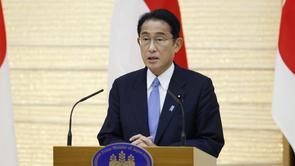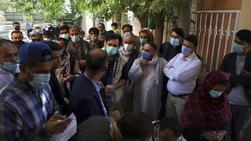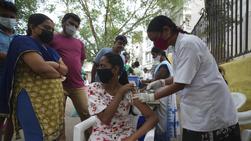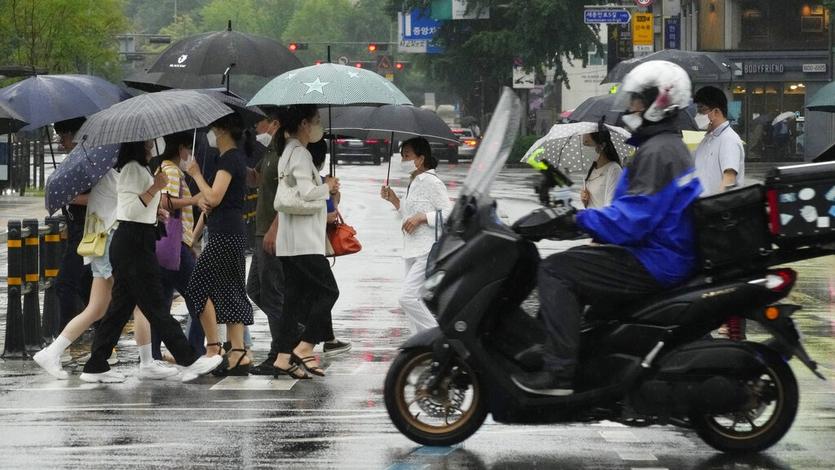 Japan's Prime Minister Fumio Kishida speaks during a news conference at the prime minister's official residence in Tokyo on July 27, 2022. (KIYOSHI OTA / Pool Photo via AP)
Japan's Prime Minister Fumio Kishida speaks during a news conference at the prime minister's official residence in Tokyo on July 27, 2022. (KIYOSHI OTA / Pool Photo via AP)
TOKYO / YANGON / SINGAPORE / KUNDUZ, Afghanistan / WELLINGTON / SEOUL / NEW DELHI / MACABEBE, Philippines - Japanese Prime Minister Fumio Kishida has tested positive for COVID-19, forcing him to cancel a planned trip to Tunisia to attend a key conference on African development, a person close to him said on Sunday.
Kishida, who has just returned from a week-long vacation, will work from his residence from Monday and will join the Tokyo International Conference on African Development (TICAD) online, the source said, asking not to be identified because he is not authorized to talk to the media.
The prime minister developed a cough and fever on Saturday and took a PCR test on Sunday morning, which confirmed the positive result in the afternoon, a Cabinet Office spokesperson said separately.
Kishida received his fourth COVID-19 vaccination shot on Aug 12, just before the beginning of his summer vacation on Aug 15.
After playing golf with his family in Ibaraki Prefecture on Tuesday, he stayed with his family at a hot spring inn in Shizuoka Prefecture on Wednesday. The following day they took in some sights in the Shizuoka, according to local accounts.
He started showing symptoms of the virus on Saturday night after returning to his residence in Tokyo on Friday afternoon and tested positive for the virus on Sunday.
The eighth TICAD and the first since 2019 is being co-hosted with the United Nations, the World Bank, and the African Union Commission. Among discussion on measures to bolster development, the gathering will look at ways to help the continent tackle the COVID-19 pandemic.
Kishida's infection comes as Japan experiences a record resurgence in coronavirus cases through July and August, hitting businesses in the world's third-biggest economy, although deaths remain relatively low and the disruptions have been milder than in some other advanced economies.
The authorities have eschewed strict lockdowns throughout the pandemic, relying on broad usage of mask wearing and social distancing to curb infections.
 Residents wait to receive the Sinopharm COVID-19 vaccine at a vaccination center in Kabul, Afghanistan, June 16, 2021. (RAHMAT GUL / AP)
Residents wait to receive the Sinopharm COVID-19 vaccine at a vaccination center in Kabul, Afghanistan, June 16, 2021. (RAHMAT GUL / AP)
Afghanistan
The number of COVID-19 cases has constantly risen in the northern Kunduz province with more than 700 people testing positive in the province over the past one month, a health official said Sunday.
"We have registered 727 positive cases of COVID-19 in Kunduz province over the past one month," head of the province's health department Mohammad Shafiq Sadeq said at a meeting with local hospital staff.
Warning of the fast spread of the virus in the province, Sadeq urged the public to follow health guidelines and wear masks when going outdoors.
He also called upon the people to take vaccine shots against the virus.
Only a 30-bed hospital is available for providing medical treatment to COVID-19 patients in Kunduz province, and 65 patients have been hospitalized there, Sadeq added.
 A health worker administers Covishield vaccine for COVID-19 at a vaccination center in Hyderabad, India on July 15, 2022. (MAHESH KUMAR A. / AP)
A health worker administers Covishield vaccine for COVID-19 at a vaccination center in Hyderabad, India on July 15, 2022. (MAHESH KUMAR A. / AP)
India
India's daily COVID-19 caseload on Monday dropped below the 10,000 mark, officials said.
According to federal health ministry data released on Monday morning, 9,531 new cases of COVID-19 were reported during the past 24 hours, taking the total tally to 44,348,960 in the country.
The cases reported on Monday mark a decrease in comparison to the daily caseload of Sunday 11,539.
With the reporting of fresh cases, India's active caseload currently stands at 97,648.
The country also logged 36 related deaths during the past 24 hours, pushing the overall death toll to 527,368 since the beginning of the pandemic, the ministry said.
With the increase in cases, the daily positivity rate stands at 4.15 percent and the weekly positivity rate was recorded 3.59 percent, the ministry data showed.
Myanmar
Myanmar confirmed 33 new cases of COVID-19 in the past 24 hours, bringing the tally to 614,654, according to the Ministry of Health on Sunday.
The health ministry said in a statement that these cases included five infected people who returned from abroad.
It added that health authorities tested 5,899 people for COVID-19 in the past 24 hours, and the daily positivity rate was 0.56 percent.
The death toll from COVID-19 in the country remained unchanged at 19,437 as no new deaths were confirmed in the past 24 hours, the ministry said.
New Zealand
New Zealand recorded 2,706 new community cases of COVID-19 and nine more deaths from the pandemic, the country's Ministry of Health said on Monday.
The number of daily cases went down steadily from over 10,000 cases nationwide more than a month ago.
With the fresh cases, New Zealand has so far reported 1,702,608 confirmed cases of COVID-19 and 1,824 deaths attributable to the disease since the pandemic hit the country in early 2020, the health ministry said.
Currently, 432 COVID-19 patients are being treated in hospitals in the country, including nine in intensive care units or high dependency units, showed official data.
 A child receives the Pfizer-BioNtech COVID-19 vaccine for children aged 5-11 as a performer dressed as superhero character Spider-Man looks on at a gym in San Juan City, suburban Manila on Feb 7, 2022. (TED ALJIBE / AFP)
A child receives the Pfizer-BioNtech COVID-19 vaccine for children aged 5-11 as a performer dressed as superhero character Spider-Man looks on at a gym in San Juan City, suburban Manila on Feb 7, 2022. (TED ALJIBE / AFP)
Philippines
Millions of Philippine students returned to classrooms for the first time in more than two years on Monday, after the country lifted most remaining COVID-19 curbs to try and reverse learning losses.
Students, all wearing face masks, queued to enter their classrooms and attended flag raising ceremonies in their schoolyards across the Southeast Asian country as the government phases out remote learning.
"For two years, we longed for face-to-face classes so even if there's a flood, we will continue our lessons," said school teacher Mylene Ambrocio, 37, as she stook in ankle-deep water in a classroom in Pampanga province north of the capital. "I am happy to see the children face-to-face."
Precautions such as temperature checks, mandatory masks and limits on the number of students per classroom remain in place.
The country's school closures due to the pandemic were among the longest in the world, with reopening delayed by slow vaccine rollouts and elections earlier this year.
In November, the education ministry pilot tested in-person classes involving almost 300 schools but only this week broadened that out to cover all schools as the new school year got underway.
The education ministry currently mandates students learn in-person for at least three days a week. Starting Nov. 2, all schools should have transitioned to five days of in-person classes, it said.
The shift to online classes, self-learning modules and educational television and radio programmes has proven extremely challenging for the country of more than 110 million where less than a fifth of households have internet access and many lack mobile devices. (https://reut.rs/3QFmKUb)
Officials have underscored how important in-person learning is for the economy to achieve long-term growth.
"We are committed to pursuing the country's full reopening, including the return of face-to-face schooling to address the learning losses and increase domestic activities," Economic Planning Arsenio Balisacan said earlier this month.
Singapore
Singapore reported 1,951 new cases of COVID-19 on Sunday, bringing the total tally to 1,816,866.
Of the new cases, 244 cases were detected through PCR (polymerase chain reaction) tests and 1,707 through ART (antigen rapid test) tests, according to statistics released by the Ministry of Health.
Among the PCR cases, 224 were local transmissions and 20 were imported cases. Among the ART cases with mild symptoms and assessed to be of low risk, there were 1,624 local transmissions and 83 imported cases, respectively.
Two deaths were reported from COVID-19 on Sunday, bringing the total death toll to 1,580, the ministry said.
 People wearing face masks cross a road in the rain near a subway station in Seoul, South Korea on July 13, 2022. (AHN YOUNG-JOON / AP)
People wearing face masks cross a road in the rain near a subway station in Seoul, South Korea on July 13, 2022. (AHN YOUNG-JOON / AP)
South Korea
South Korea reported 59,046 new COVID-19 cases as of midnight Sunday compared to 24 hours ago, raising the total number of infections to 22,299,377, the health authorities said Monday.
The daily caseload was down from 110,944 in the prior day and lower than 62,056 tallied a week earlier, according to the Korea Disease Control and Prevention Agency (KDCA).
For the past week, the daily average number of confirmed cases was 125,949.
Sixty-five more deaths were confirmed, leaving the death toll at 26,109. The total fatality rate was 0.12 percent.


